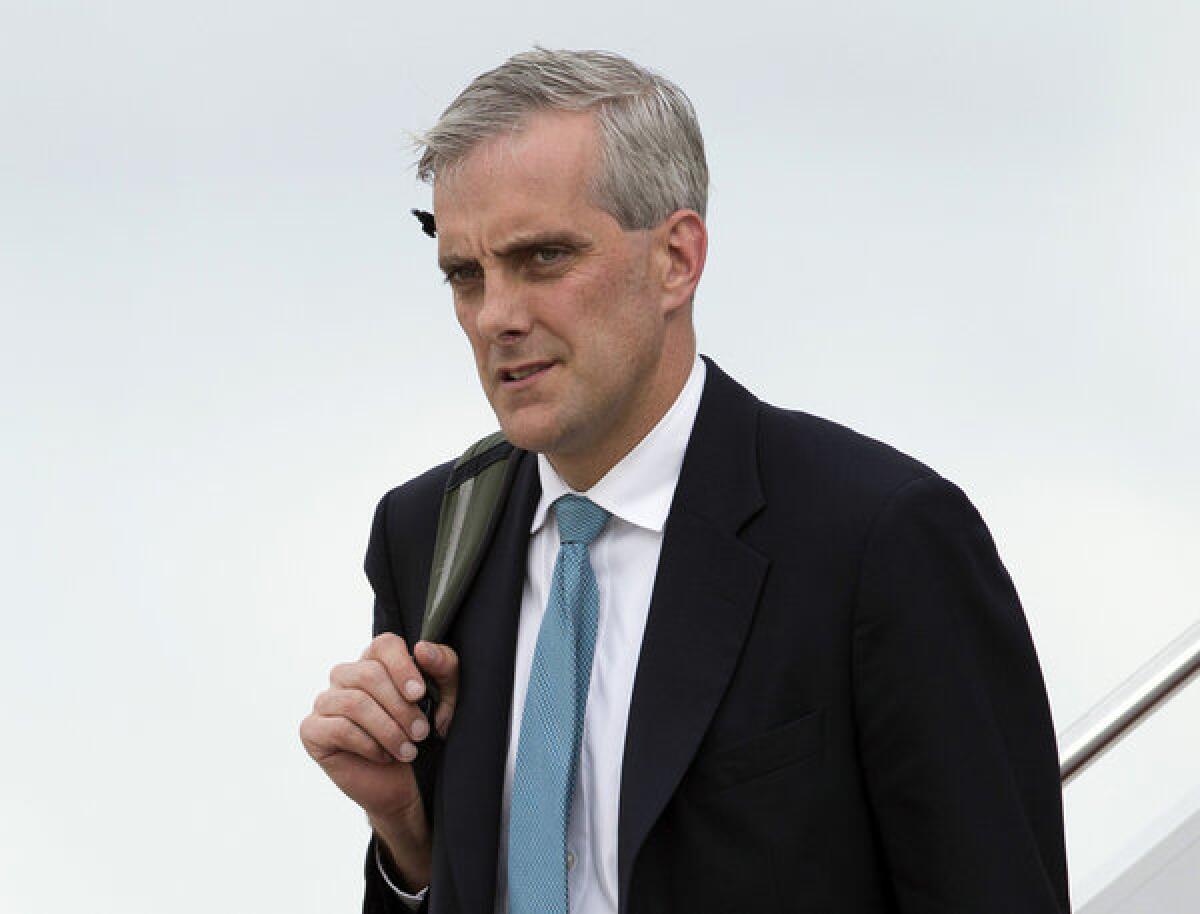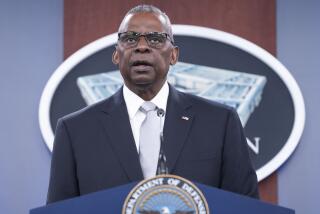Obama adviser warns of consequences if Syria not punished

- Share via
WASHINGTON –A failure by Congress to support President Obama’s proposed punitive strike on Syria would encourage Iran, Syria and their militant allies to press ahead with efforts to develop and use weapons of mass destruction, the White House chief of staff warned Sunday.
Syrian President Bashar Assad and Iranian leaders “are watching closely what is happening in Washington,” Chief of Staff Denis McDonough argued on five Sunday TV talk shows as the White House stepped up its flagging campaign to win support for strikes.
“If Congress wants to make sure that the Iranians, Hezbollah and others understand that you cannot have greater operating space to pursue weapons of mass destruction like the nuclear program in Iran, then they have to vote yes for this resolution,” McDonough said on CBS’ “Face the Nation.”
Support for Obama’s position remains weak among lawmakers and foreign leaders, and the White House is struggling to make up ground lost over the past week as members of Congress were away from Washington in their districts, hearing mostly opposition to the proposed attack on Syria.
Many lawmakers say calls from constituents about Syria are running 10 to 1 or more against military action. While the administration appears to have majority support in the Senate, several informal counts of the House indicate only about two dozen lawmakers committed to voting yes. The number publicly committed to voting no is approaching the 218 needed to defeat the proposal in that chamber.
The administration is expanding its sales campaign with public appearances and private efforts to persuade. Top officials have scheduled a series of meetings with lawmakers, who return to work Monday. Obama has scheduled a round of television interviews for Monday and a prime-time television appearance for Tuesday night.
Historically, however, even the best-crafted Oval Office addresses have rarely –- if ever -- shifted public sentiment on issues where Americans have strong feelings.
As part of the administration’s effort, McDonough in his talk show appearances stressed the “unbelievable, horrendous” quality of Assad’s alleged chemical weapons attack on Aug. 21, which the Obama administration says killed more than 1,400. All lawmakers should watch videos that the administration has gathered showing the effects of the chemical attack, he said.
Failure to enforce a 100-year-old worldwide norm against use of chemical weapons could make U.S. troops vulnerable, he added, saying that a vote against striking Syria could have “very direct consequences for our men and women.”
Administration officials have been trying to marshal the most powerful arguments. They have compared Assad to Adolf Hitler, and contended that the decision facing the United States is like the one the British faced in Munich, Germany, in 1938 of whether to appease or challenge Hitler.
Assad denies that his forces were responsible for the chemical attack. His government has said it believes the toxic substance, which the United States has identified as sarin nerve gas, was released by anti-government rebels eager to draw Western forces into the conflict.
McDonough said he understood Americans’ deep fears about another war in the Middle East, but argued that this military action will be nothing like those the United States undertook in Iraq, Afghanistan or Libya.
He described it as a “targeted consequential, limited attack” that would not draw the United States into a deeper war but would deter Assad from further chemical weapons attacks.
The threat of such enforcement actions was responsible for suppressing most use of chemical weapons since World War I, he said.
While insisting that the goal was only to “degrade” Assad’s ability to deliver chemical weapons, he also conceded on NBC’s “Meet the Press” that a U.S. strike would have an impact on Syria’s civil war. “There is no question that momentum on the battlefield will be changed” by the planned strikes, he said.
Some experts challenge the assertion that fear of punitive strikes has deterred countries from using poison gas. Jeremy Shapiro, a former Obama administration State Department official now at Brookings Institution, said that chemicals have been seldom used simply because they are too unwieldy and tough to target to have much military use.
CBS News said Sunday that it conducted an interview with Assad in which he threatened retaliation against the United States for any attack, and denied using chemical weapons.
Interviewer Charlie Rose said on “Face the Nation” that Assad had told him in the interview that there would be retaliation from “people that are aligned with him.” The interview is to be broadcast on PBS’ “Charlie Rose” show on Monday night.
ALSO:
Israel accuses Palestinians of leaking news from peace talks
Excitement rocks Tokyo upon selection as 2020 Olympics site
Dennis Rodman arrives in China from North Korea without Kenneth Bae
More to Read
Sign up for Essential California
The most important California stories and recommendations in your inbox every morning.
You may occasionally receive promotional content from the Los Angeles Times.











